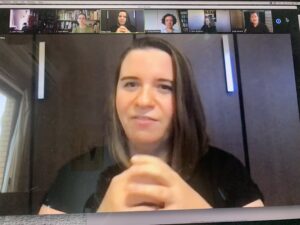Zoom meeting on July 18, 2021

WiK’s July meeting was a departure from our usual presentations by publishers and published authors, with a workshop led by creativity coach Paige Baldwin Ando. She is based in Tokyo but coaches people from all around the world. To give us a taste of how her coaching works, Paige devoted the latter half of the session to taking questions from participants. Her advice was simple—in the way that truths often are—but also powerful. Over Zoom, we watched the expressions on the faces of our fellow inquirers clear as a path through their current creative blockages seemed to open for them.
Paige started the workshop with an exercise. She had us think about containers: any structure that helps you organize and support your work. These “things that you can pour your work into” include aspects such as time (for example, writing for one hour, or creating time for oneself); physical space (a room, a desk, a portable table that you can erect when you work); numbers (a word count, page count, episodes in a series); a subject, theme or project; rhythms and rituals within the structure of your day that may determine when you write; relationships like classes or our own writers’ group. These need to be factors that support you, not constrict you. And you need to be in control of how they are used.
Paige then had each of us write down the various containers that we have used in the past, and then to separate them according to those that have worked for us, and those that haven’t. She then asked us to consider how we can use the containers that work for us in a current or upcoming project.
Paige then opened the floor to questions. In her one-on-one coaching, Paige works with each individual to hone in on the difficulties they are experiencing and come up with methods that will work for them. But as the Q&A began, it was clear that many of us hit the same brick walls. The first question was about one of those—procrastination, and its common companion, perfectionism.

Paige enlightened us to the presence in our brains of the amygdala, which the dictionary tells me “plays an important role in motivation and emotional behavior.” Paige explained it as a part of the brain that is looking out for us and wants to protect us. It has been programmed, in large part, by the well-meaning cautions of our parents when we were kids and includes classic phrases such as “don’t risk making a fool of yourself in front of others,” “no-one likes a show-off,” “don’t set your goals too high.”
The amygdala is a fear mechanism and it doesn’t want you to try anything new, in case you fail. So you need to fly below its radar by taking ridiculously tiny steps toward your goal. Things like deciding to just open your PC, or just write one sentence. Although it doesn’t seem like it, such small steps are very powerful, Paige says. Be kind to your amygdala and coach it to acknowledge that the small steps that you have taken haven’t caused any harm.
If you would like to learn more about the amygdala, and how to trick it, Paige recommends a book called, One Small Step Can Change Your Life by Robert Maurer. A number of participants immediately ordered it.
Another question dealt with being overwhelmed, particularly regarding the amount of content for a non-fiction book. Crucially, Paige reminded us that creativity is about having fun. Since the logical approach of creating an outline and following it wasn’t helping the writer format her work, Paige advised handling the problem intuitively instead, by starting with whatever part of the information was fun for her and teasing out that thread first, and to then keep pulling on various threads that bring the writer joy. Paige cautioned that the writer may have to do that a dozen times or more, but that in doing so, the shape of the work would come to her. Meanwhile, she will have made progress on the content of each section.
The next question was how to face non-fun aspects, particularly those encountered when writing memoir. Paige advised confronting those topics as the person you are now—a different person to the one who went through those difficult experiences and came out the other side. For help with that, Paige recommended a book called Presence, by Amy Cuddy.
A final question asked Paige to reveal some of the techniques her clients have used to spur ideas. She told us about a visual artist who removed all their clothes in order to gain a fresh and closer view of their work, and one who turned their painting upside down to do that. She also mentioned someone who, in order to bridge the generational gap between her and her niece, proposed that they write letters to each other as if they were ladies living in the 18th century.
Alongside the one-on-one coaching, Paige offers a range of creative activities via her website (Home | Whole Self Creative). She runs a free, online co-creation session each week, online visual journaling classes, and from September, a group coaching session. You might also like to check out her Instagram page—you know, just a little thing you can do that won’t worry your amygdala.
*********************
A video of the day’s workshop is due to be posted to YouTube soon.

